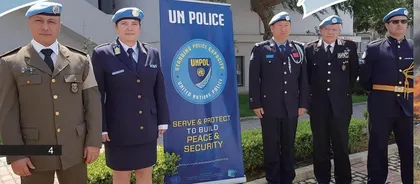Tour of Duty英勇无畏的维和警察

We love peace. But sometimes there are wars and disasters in the world. Peacekeepers help people in those places. They help us live happily in a peaceful world.
They come from more than 120 different countries, like China, the United Kingdom(英国), the United States. The United Nations(UN,联合国) gives orders(下命令) to them.
UN peacekeepers always wear light blue berets or helmets. So people call them Blue Berets or Blue Helmets. On their berets or helmets, there are two letters, UN.
The main task(主要任务) of the peacekeepers is to keep peace in the world. When there is a war somewhere, the peacekeepers go there to help people out of danger.
When there is an earthquake, a tsunami or other kinds of disasters, the peacekeepers go to help people there. They help to save people’s lives and build new houses.
They also help build roads and bridges, treat patients(治疗病人), transport materials(运输物资) and clear explosives(清理爆炸物).
There are very strict rules(严格的规定) for selecting peacekeepers. In China, a peacekeeper must be more than 25 years old. He or she has to work as a police officer(警察) for at least(至少) 5 years. A peacekeeper should be able to speak English. They should know UN rules very well. He or she must have good driving skills. And of course, they should be healthy.
If a person fits all the conditions, he or she can take an exam. The Ministry of Public Security(公安部) holds this exam.
After people pass the exam, they will go to receive training(接受培训). It takes about three months. They take many different classes in the training, like languages, shooting, driving, first aid(急救), mine sweeping(扫雷) and learn how to live outdoors.
After the training, they have to pass a UN exam.
May 29 is the International Day of United Nations Peacekeepers(联合国维和人员国际日). Every year the UN holds a ceremony for all peacekeepers on this day.
It makes us remember the peacekeepers working for the UN and the ones who lost their lives for the world.
peace /piːs/ n. 和平 war /wɔː(r)/ n. 战争
disaster /dɪˈzɑːstə(r)/ n. 灾难 peacekeeper /ˈpiːskiːpə(r)/ n. 和平卫士
peaceful /ˈpiːsfl/ adj. 和平的 beret /ˈbereɪ/ n. 贝雷帽
helmet /ˈhelmɪt/ n. 头盔 main /meɪn/ adj. 主要的
task /tɑːsk/ n. 任务 earthquake /ˈɜːθkweɪk/ n. 地震
tsunami /tsuːˈnɑːmi/ n. 海啸 bridge /brɪdʒ/ n. 桥梁
treat /triːt/ v. 治疗 patient /ˈpeɪʃnt/ n. 病人
transport /ˈtrænspɔːt/ v. 运输 material /məˈtɪəriəl/ n. 材料,物料
explosive /ɪkˈspləʊsɪv/ n. 炸药 strict /strɪkt/ adj. 要求严格的
rule /ruːl/ n. 规章,条例 select /sɪˈlekt/ v. 挑选
fit /fɪt/ v. 适合,符合 condition /kənˈdɪʃn/ n. 条件
hold /həʊld/ v. 举办 receive /rɪˈsiːv/ v. 接受
training /ˈtreɪnɪŋ/ n. 训练 shooting /ˈʃuːtɪŋ/ n. 射击
mine /maɪn/ n. 地雷,水雷 sweeping /ˈswiːpɪŋ/ n. 打扫,清扫
ceremony /ˈserəməni/ n. 仪式 lose /luːz/ v. 失去(过去式:lost)
life /laɪf/ n. 生命